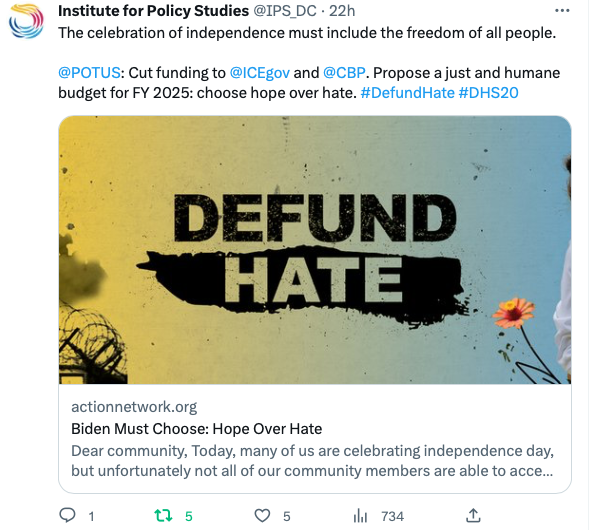On July Fourth, Let’s Celebrate by Reimagining Immigration Policy
By
Jyotsna Naidu
Posted:
|
Military & Security
Take action to ask President Biden to support funding cuts for deportations and detentions.
This July 4th, it's time to fight for national immigration reform.
On May 11, the pandemic-era immigration measure Title 42 ended with 2.8 million total migrants deported. The next day, the US renewed a decades-old immigration law, Title 8, which covers everything from asylum and refugees to deportations. Under Title 8, migrants rejected from asylum will be banned from re-entry for five years. But we shouldn’t settle for decades-old laws governing immigration. It’s past time for a more modern, humane and fair immigration policy.
Taxpayers spent a record $26 billion on border patrol and deportations this year with little to show for it. Over the past 20 years, the U.S. has deported more than five million people, the majority of whom were living their own lives, having committed no legal offense but their existence in this country. To put $26 billion into perspective, we could pay the salaries for 285,888 public elementary school teachers, or more than 3 million public housing units. Instead, both public schools and federal housing programs face budget cuts or freezes under the recently negotiated federal budget deal.
We should redirect federal dollars toward real community needs, and fix the immigration process to help both immigrants and our communities. Instead, states left to their own devices to address migrants in a broken system are undermining both federal law and the basic humanity and dignity of immigrants subjected to harsh treatment. The ensuing court cases bare these realities. The ACLU filed a case against the inhumane conditions of state immigration practices. Just last week, the Supreme Court upheld the right of the federal government to set deportation priorities, over challenges from Texas and Louisiana. Still, the case has narrow implications. We’ve repeatedly seen state governors hype immigration as a political issue by bussing desperate immigrants to other states. These struggles will continue, and immigrants will suffer, until federal policy steps up with humane and just solutions.
In my home state of Texas, funding for border enforcement and militarization has more than quadrupled in 8 years to $4.6 billion. Texas’ Operation Lone Star, the reason for the surge in funding, is ostensibly aimed at drug trafficking at the border. Yet the majority of arrests are for simple trespassing, nicknamed a “catch-and-jail” program. One arrest of an Ecuadorian migrant for trespassing was deemed unconstitutional, but a single ruling couldn’t change the system. Instead of allowing humane passage for migrants fleeing violence, persecution, and extreme poverty, borders are a site for sweeping militarized crime policy.
Migration is a concern for every country on the planet, and increasingly so at a time of growing climate crisis, authoritarianism, and instability. But knee-jerk, politicized solutions also ignore our involvement in the root causes of migration. The US must contend with its role in destabilizing Central American politics among other global interventions. Asylum is truly the bare minimum protection in a country that claims itself as a nation of immigrants and opportunity.
We should care about immigration policy for how the treatment of migrants is a reflection of our country’s values. But these policies do not only impact migrants. Billions of taxpayer dollars fund border patrol, and every dollar used for militarizing immigration is a dollar that doesn’t go toward public health, education, housing, or other real needs.
One group moving us forward is Defund Hate, a coalition for immigrant rights. Defund Hate is composed of 60+ organizations representing faith leaders, civil rights advocates, and directly impacted immigrant communities.
Defund Hate just launched a campaign to demand that the Biden administration deprioritize funding for deportations and detentions and instead invest in making communities stronger. So far, President Biden’s plans for a more humane immigration system (like under his Build Back Better plan) have gone nowhere in Congress. President Biden has one more presidential budget request in this term, due in February 2024, when he can ask Congress to take a different approach on immigration.
It’s not too late for President Biden to set a precedent of treating migrants with care, dignity, and respect, and request that Congress cut spending on deportations and detentions. It would be a powerful first step to remaking our broken, decades-old immigration system.
Jyotsna Naidu is a Next Leader with the National Priorities Project at the Institute for Policy Studies.
